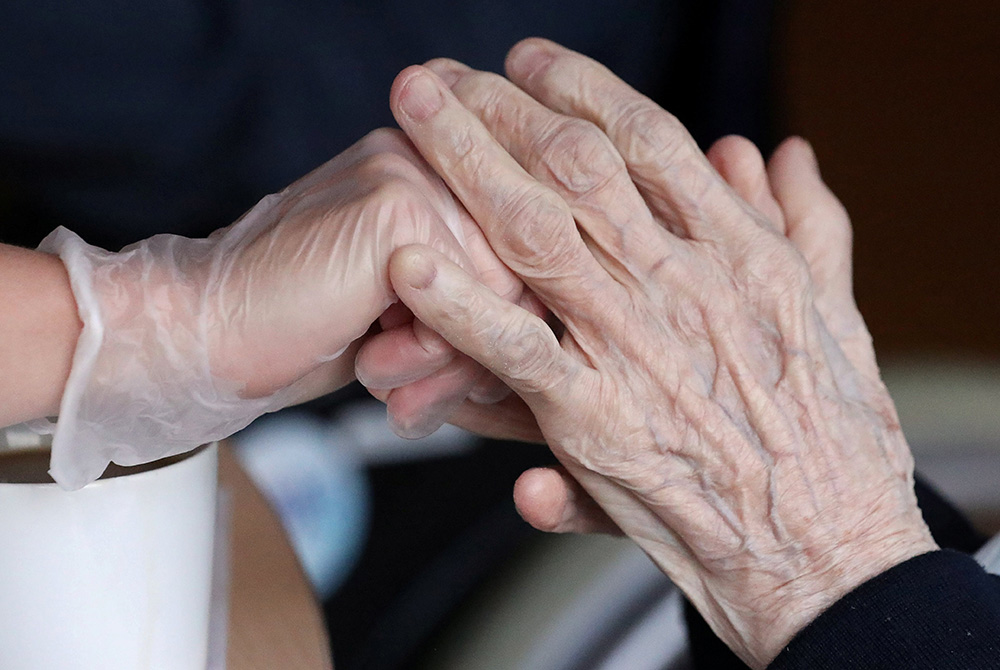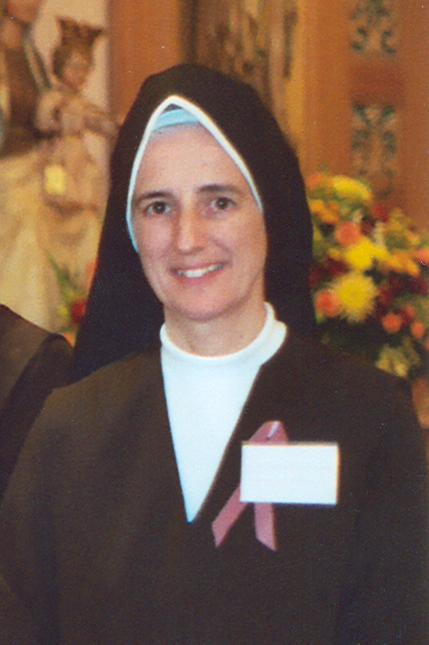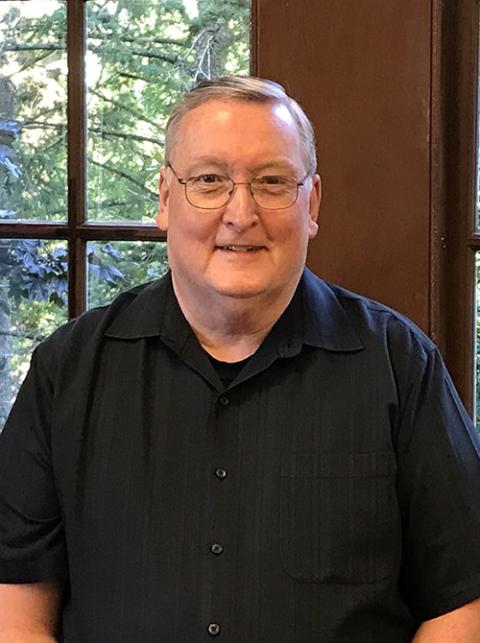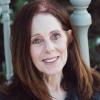
An employee holds the hand of a person at an elderly residence in Brussels April 14, 2020, during the COVID-19 pandemic. (CNS/Reuters/Yves Herman)
After a year like no other in recent memory, the umbrella group representing men in Catholic religious orders in the U.S. is retooling an annual summit on caring for aging members to focus on promoting wellness and finding creative ways to collaborate and share resources with each other.

Carmelite Sr. M. Peter Lillian Di Maria, who directs the Avila Institute of Gerontology (Provided photo)
While over the previous five years the Eldercare Summit of the Conference of Major Superiors of Men drew participants from New York, New Jersey, Connecticut and Pennsylvania, this year's gathering on Sept. 14-15 will take place online. For the first time it will be open to members of religious communities nationwide.
Speakers include Jesuit Fr. Myles Sheehan, a medical doctor on the faculty of the Georgetown University Center for Clinical Bioethics; psychologist Paul Ashton, who specializes in psychological care of religious; and Carmelite Sr. M. Peter Lillian Di Maria, who directs the Avila Institute of Gerontology.
The annual conferences (there wasn't one last year because of the pandemic) are the brainchild of Maryknoll Br. Wayne Fitzpatrick, who initiated them five years ago.
At the time, Fitzpatrick told NCR, he had been the managing director of senior care for his community. Fitzpatrick began to wonder how other groups were tackling issues like pastoral care, promoting wellness among the aging, and how to help members make the transition from one level of care to another.
To find out, Fitzpatrick invited representatives from local men's congregations to gather. Eventually, the meetings included area women religious. Every year, the numbers ticked up, he said.
Whether the congregation is large, or small, said Fitzpatrick, "my community might have something your community needs, or yours something that mine might need. There's a learning on both sides."
Ideas emerging from previous get-togethers included the possibility of sharing a pastoral care team or making extra space in an assisted living facility available to men from another order, he said.
Then came the pandemic. Last year, in the space of a few months, the Maryknoll brothers lost 15 men to the virus, he said. Maryknoll leaders used the in-house TV station to offer prayers, updates and even virtual retreat days, and made sure to keep in touch by phone, he said.
But communal events like ordination anniversaries, Masses and feast days couldn't be celebrated together.
"We began to see the incredible impact that isolation had on our elders," he said. "We're just scratching the surface about the implications of this pandemic on local communities."

Maryknoll Br. Wayne Fitzpatrick (Courtesy of Maryknoll Br. Wayne Fitzpatrick)
"A lot of older people in the United States have been traumatized," said Sheehan. "So have people in religious orders, because so many of the things that were good in our health care communities had to be stopped during the pandemic. Returning to what we'd call 'regular order,' I think, will do a lot towards healing."
Studies of both men and women in religious orders have demonstrated the importance of community life.
Jesuit Fr. Thomas Gaunt, who heads Georgetown University's Center for Applied Research in the Apostolate, or CARA, has researched the importance of community life among his fellow Jesuits and its apparent effect on longevity.
"Older religious [priests and brothers] are engaged with the community, and with a variety of people, ministries and activity that are very positive and affirming for them," said Gaunt. "Religious life mitigates the effects of social isolation."
Though Gaunt cautioned that he couldn’t speak for groups beyond the Jesuits, he attributed the change in part to the increased focus on common life sparked by the renewal of religious life since the Second Vatican Council.
Sheehan, who will be speaking at the September conference, said he plans to address not only the biological but the psychological, social and spiritual aspects of health and wellness.
"With religious communities, I also look at how one lives in community," he said. For men dedicated to the particular work of their congregation, he said, it also means being faithful to the mission of the particular group.
Advertisement
Pallottine Fr. Frank Donio, the executive director of the Conference of Major Superiors of Men, said that this particular meeting is part of a larger post-pandemic effort to support not only major superiors and other leaders, but to ask how the conference can assist them in other areas.
In addition to offering opportunities for collaboration, and a virtual meeting place for those engaged in eldercare, it's also an opportunity to assess what the past year and a half has taught them about caring for their elders, he said.
"Our hope is that that this will further conversation," Donio said, suggesting that the need for different models of care suitable to the needs of a community will persist.
Though many religious have access to particularly good health care, said Donio, some communities with aging members may be caring for them at home, or have elderly members who are still working full time into their 80s and even their 90s.
When men can no longer participate in these ministries, asked Donio, "what brings meaning to what they are doing, when it can't be done in the same way? How do we assist our brothers to a different way?"
Di Maria also has a lot of experience helping religious communities and families navigate the multiple challenges of aging. While she said her talk will address cognitive decline in the aging, she described her mission as wider: to identify the grief over the losses that can accompany aging — including that of family members, daily routines, position and ministries — and to assist those working with the elderly to be helpful as they grieve.
"It's hard to move on if you don't recognize what's happening," she said. "Then you can't get to acceptance and move on to hope. "
Though men can sometimes seem more task-oriented than women, she said, she's seeing "more and more religious men and communities really reach to each other and [see] how they can help each other age gracefully."
"My hope is to help those attending identify some of the grieving we all go through as we age, and also to see how we can look at ways to be helpful in that grieving process," said Di Maria.
The man who launched the initial conference more than five years ago is now pondering something less concrete: how to integrate what he calls the "spirituality of storytelling" into his work with the elderly.
The medical model is one thing, said Fitzpatrick. But "we need to take a much more critical approach to pastoral spiritual care in allowing our elders to share their stories."
When that kind of exchange happens, it's an incredible experience, he said.








